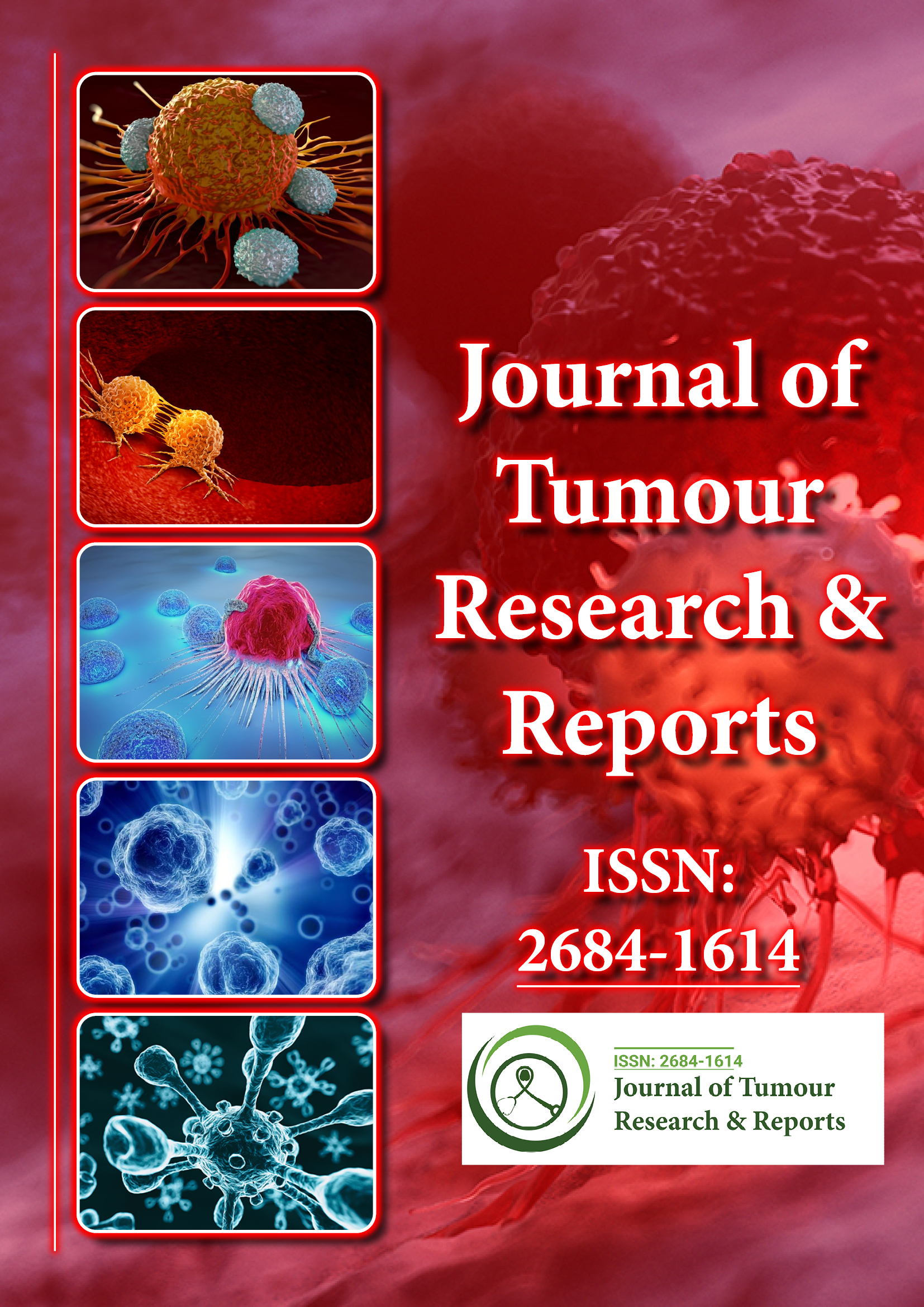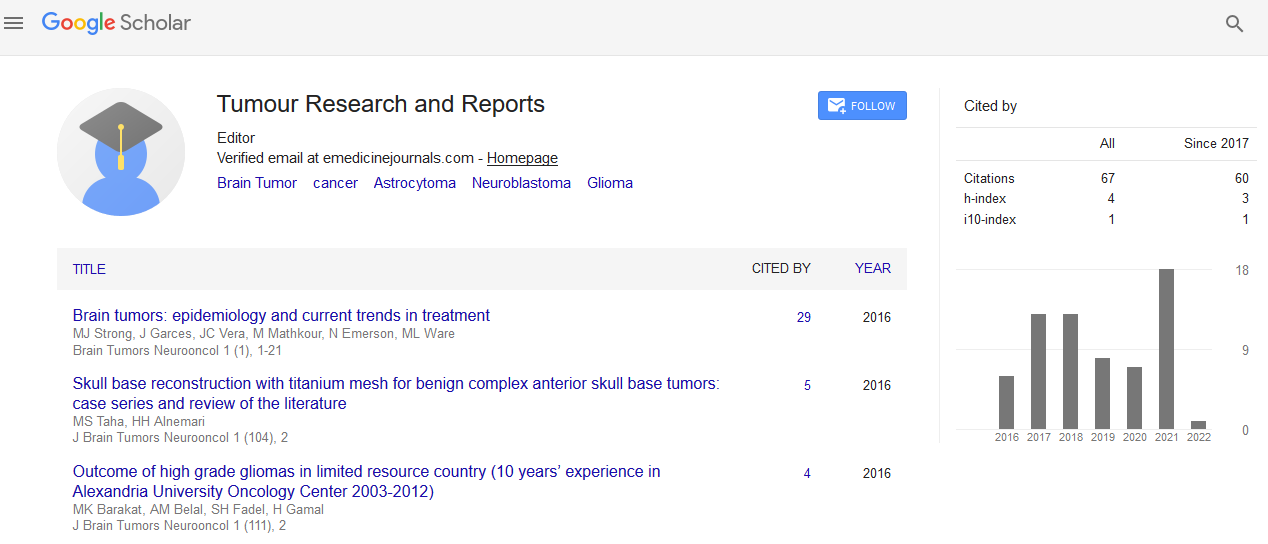Indexed In
- RefSeek
- Hamdard University
- EBSCO A-Z
- Google Scholar
Useful Links
Share This Page
Journal Flyer

Open Access Journals
- Agri and Aquaculture
- Biochemistry
- Bioinformatics & Systems Biology
- Business & Management
- Chemistry
- Clinical Sciences
- Engineering
- Food & Nutrition
- General Science
- Genetics & Molecular Biology
- Immunology & Microbiology
- Medical Sciences
- Neuroscience & Psychology
- Nursing & Health Care
- Pharmaceutical Sciences
Opinion - (2024) Volume 9, Issue 1
Immune Gene Expression Profiles: Prognostic Markers in Gallbladder Carcinoma
Maria Meilita*Received: 01-Mar-2024, Manuscript No. JTRR-24-25369; Editor assigned: 04-Mar-2024, Pre QC No. JTRR-24-25369 (PQ); Reviewed: 18-Mar-2024, QC No. JTRR-24-25369; Revised: 25-Mar-2024, Manuscript No. JTRR-24-25369 (R); Published: 01-Apr-2024, DOI: 10.35248/2684-1614.24.9:218
Description
Gallbladder Carcinoma (GBC) remains as a challenge in oncology due to its aggressive nature and limited treatment options. Among the various factors contributing to its complexity, the interplay between immune genes and tumor progression has gained significant attention. In recent years, understanding the role of immune genes in GBC has emerged as a potential possibility for advancing both diagnostic and therapeutic strategies.
The significance of immune genes in gallbladder carcinoma
GBC often presents at advanced stages, providing traditional treatment modalities like surgery, chemotherapy, and radiotherapy less effective. In this context, the immune system's role in cancer surveillance and control becomes potential. Immune genes encode proteins involved in various aspects of the immune response, including immune surveillance, inflammation, and immune evasion mechanisms exploited by cancer cells.
Immune evasion and tumor progression
Cancer cells employ diverse strategies to evade immune surveillance, facilitating tumor growth and metastasis. Immune genes play a pivotal role in modulating these processes. For instance, variations in genes encoding immune checkpoint proteins like PD-L1, CTLA-4, and PD-1 have been implicated in GBC progression by inhibiting T cell-mediated antitumor immune responses.
Genetic landscape of gallbladder carcinoma
Recent genomic studies have provided insights into the genetic alterations driving GBC pathogenesis. Mutations in immune-related genes, including those involved in antigen presentation (e.g., HLA genes), cytokine signaling pathways, and immune checkpoint regulators, have been identified in GBC tumors. These genetic alterations contribute to tumor immune evasion and shape the tumor microenvironment, influencing treatment response and patient outcomes.
Prognostic and predictive implications
The expression profile of immune genes in GBC tumors holds prognostic and predictive value. High expression levels of certain immune genes have been associated with favorable clinical outcomes, suggesting their potential as prognostic biomarkers. Moreover, immune gene signatures can predict response to immunotherapy and guide treatment selection, paving the way for personalized therapeutic interventions in GBC.
Immunotherapeutic strategies
Understanding the immune system to target GBC represents a potential therapeutic approach. Immune Checkpoint Inhibitors (ICIs), monoclonal antibodies targeting immune checkpoints, have demonstrated efficacy in various cancers, including those with limited treatment options like GBC. Clinical trials evaluating the efficacy of ICIs alone or in combination with other agents are underway, providing possibility for patients with advanced GBC.
Challenges and future directions
Despite the potential of immunotherapy, challenges remain in optimizing its efficacy in GBC. Tumor heterogeneity, immunosuppressive tumor microenvironment, and resistance mechanisms pose significant problems. Addressing these challenges requires a deeper understanding of the immune landscape of GBC and the development of innovative therapeutic strategies targeting immune-related pathways.
The complex interplay between immune genes and GBC highlights the potential for immunotherapy to revolutionize GBC treatment model. Genetic insights into immune dysregulation in GBC provide a foundation for developing targeted therapies aimed at restoring antitumor immunity and overcoming immune evasion mechanisms. Continued research efforts aimed at elucidating the role of immune genes in GBC pathogenesis and therapeutic response holds potential for improving patient outcomes and advancing precision oncology in GBC management.
In conclusion, the integration of immune genomics into the clinical management of GBC represents a transformative approach toward personalized medicine and improved patient care in this challenging malignancy.
Citation: Meilita M (2024) Immune Gene Expression Profiles: Prognostic Markers in Gallbladder Carcinoma. J Tum Res Reports. 9:218.
Copyright: © 2024 Meilita M. This is an open access article distributed under the terms of the Creative Commons Attribution License, which permits unrestricted use, distribution, and reproduction in any medium, provided the original author and source are credited.

